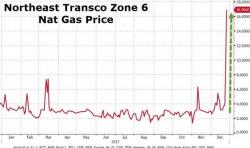Trump To Rollback Deepwater Horizon Regulations

Authored by Nick Cunningham via OilPrice.com,
The Trump administration is hoping to slash regulations on offshore oil drilling that were implemented after the 2010 Deepwater Horizon disaster that killed nearly a dozen people and led to an oil leak that spewed for months.



